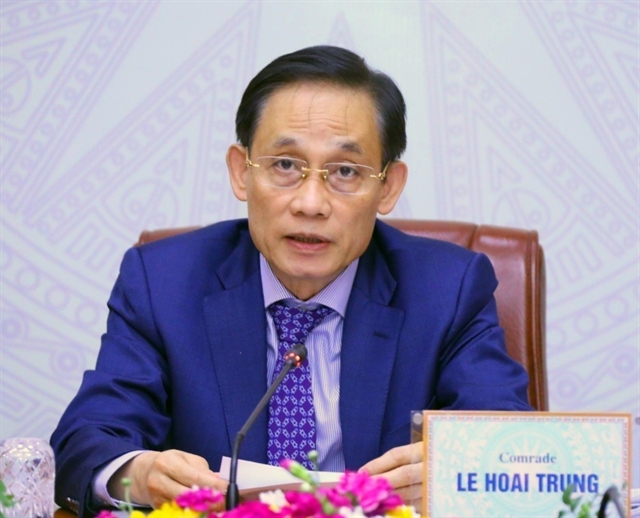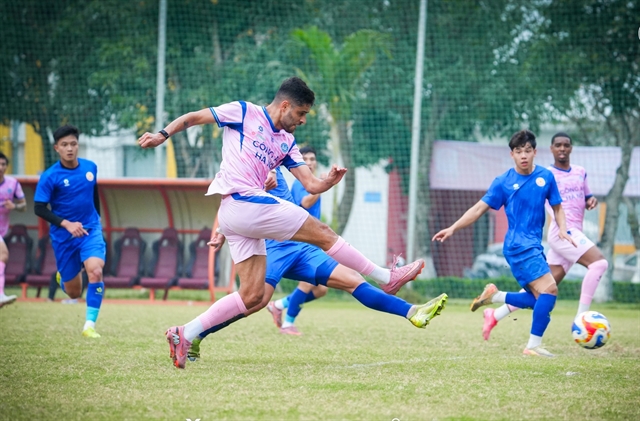 Talk Around Town
Talk Around Town

 |
| Illustration by Trịnh Lập |
By Thanh Nga
The 2024 ASEAN Cup is shaping up to be an exhilarating showdown, highlighting a fierce competition between two of Asia's football powerhouses: Japan and South Korea.
This year's tournament is not just about the teams; it is also a battle of tactics and philosophies led by foreign coaches, with both nations significantly represented.
Out of the 10 teams participating in the 2024 ASEAN Cup, nine have opted for foreign coaches, reflecting a growing trend in Southeast Asian football. Among these coaches, six hail from Japan and South Korea, creating a balanced rivalry, with three coaches from each country.
South Korean figures include Kim Sang-sik leading Việt Nam, Shin Tae-yong at the helm of Indonesia, and Ha Hyeok-jun coaching Laos.
On the Japanese side, Masatada Ishii oversees Thailand, Tsutomu Ogura leads Singapore, and Koji Gyotoku manages Cambodia. Additionally, Spain is represented by coaches Albert Capellas for the Philippines and Pau Marti Vicente for Malaysia, while Timor-Leste is under the guidance of Chilean coach Simon Correa.
Myanmar, however, has faced challenges, recently parting ways with German coach Michael Feichtenbeiner. Despite attempts to recruit a Japanese coach, they appointed former player Myo Hlaing Win as the temporary head coach.
Northeast Asian influence
The competition at the ASEAN Cup is poised to be dominated by Northeast Asian coaches, particularly those from South Korea and Japan. Teams like Thailand, Indonesia and Việt Nam are seen as top contenders for the championship, largely due to their experienced leadership.
One of the main reasons Southeast Asian teams gravitate towards these coaches is their rich football backgrounds, which are among the best in Asia. Moreover, the cultural similarities between Northeast Asia and Southeast Asia facilitate smoother transitions for these coaches. Unlike European coaches, who may struggle with cultural differences, Northeast Asian coaches can quickly connect with their players, enabling them to tailor training regimens that better match the local style of play.
Take the Vietnamese team as an example. The previous coach, Frenchman Philippe Troussier, struggled due to his rigid emphasis on "reason" and "principles", which did not resonate with the players. In contrast, Kim's return to the team has reignited hopes for success.
The quest for glory
The 2024 ASEAN Cup is crucial for teams looking to assert dominance in Southeast Asian football. The stakes are high, with coaches facing immense pressure due to recent underwhelming performances. Many have already lost their jobs, and even national football federation heads have resigned following disappointing results.
Historically, the ASEAN Cup has been a litmus test for footballing prowess in the region. During the 2017-2018 period, Thailand became the first Southeast Asian team to reach the final qualifying round for the 2018 World Cup, yet they failed to secure the ASEAN Cup title.
Similarly, Việt Nam made history as the only Southeast Asian representative in the 2022 World Cup qualifiers, but fell short in both the 2020 and 2022 ASEAN Cups against Thailand.
Indonesia currently stand tall in the Asian qualifiers for the 2026 World Cup, recently stunning the football world by defeating Saudi Arabia. Coach Shin's team have accumulated six points—a record for a Southeast Asian team at this stage. However, the Indonesian squad are equally focused on the 2024 ASEAN Cup, a trophy that has eluded them for years. For them, winning this tournament has become a matter of regional pride.
High stakes for coaches
For coaches like Shin and Kim, the 2024 ASEAN Cup represents more than just a title; it is an opportunity to cement their legacies. Shin, who has extended his contract until 2027, is currently the highest-paid coach in the tournament, earning around US$1.5 million a year. His exceptional salary reflects the high expectations placed on him as Indonesia aim for both regional and global recognition.
On the flip side, Kim faces mounting pressure to deliver results for Việt Nam. His tenure has been marked by a lack of tangible improvements in FIFA rankings, raising questions about his future. A successful campaign in the ASEAN Cup could secure his position and allow him to continue his vision for Vietnamese football. Conversely, a disappointing run may force a re-evaluation of the national team’s direction.
Japanese coach Ishii of Thailand is also under scrutiny. Following two consecutive draws, including a lacklustre performance against Laos, he must rally his team to meet the expectations of Thai fans, who are renowned for their passionate support.
As the 2024 ASEAN Cup unfolds, the tournament not only serves as a platform for showcasing footballing talent but also as a battleground for Northeast Asian coaching philosophies. With the stakes higher than ever, the competition promises to deliver thrilling matches and compelling storylines.
The clash between South Korean and Japanese coaches will undoubtedly be a focal point in this exciting chapter of Southeast Asian football. As teams vie for supremacy, the outcomes will shape the future of football in the region, influencing recruitment strategies and coaching philosophies for years to come. The ASEAN Cup is more than just a trophy; it is a testament to the evolution of football in Southeast Asia - a stage where dreams can be realised, and legacies forged. VNS




